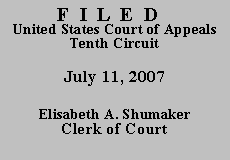

BENNY R. SMITH,
Petitioner-Appellant,
v.
SEDGWICK COUNTY DISTRICT
COURT,
Respondent-Appellee.
Before BRISCOE, McKAY, and
McCONNELL, Circuit Judges.
This pro se § 2254 appeal stems from Petitioner's attempt to compel the
Sedgwick County District Court to send certified file-stamped copies of various
court documents to Petitioner. The confusing nature of Petitioner's request
prompted the Kansas federal district court to analyze the request as both a writ of
mandamus and a petition for habeas relief. First, the district court refused to
issue a writ of mandamus after correctly concluding that federal courts lack the
authority to issue such writs to state courts. (Doc. 5 at 2 (citing Van Sickle v.
Holloway, 791 F.2d 1431, 1436 n.5 (10th Cir. 1986)).) Second, the district court
ordered Petitioner to show cause why, assuming his request was in fact seeking
habeas relief, the petition should not be dismissed as untimely. Petitioner filed
an interlocutory appeal challenging the show cause order, which a panel of this
court dismissed for lack of jurisdiction.
After Petitioner filed a response, three supplements, and various requests and motions, the district court determined that the habeas petition was timely but noted that the claims did not appear to be properly exhausted. As a result, in an attempt to sort out the confusing mix of asserted claims, the district court ordered Petitioner to submit a completed form petition in conformance with District of Kansas Rule 9.1(a). The district court stated that failure to complete the supplied form could result in dismissal without prejudice of his habeas petition. Petitioner refused to comply, and the district court dismissed the habeas petition without prejudice and denied Petitioner's request for a certificate of appealability.
Petitioner must obtain a certificate of appealability in order to challenge the district court's denial of his habeas petition. See Montez v. McKinna, 208 F.3d 862, 867 (10th Cir. 2000). To obtain a certificate of appealability, Petitioner must make a "substantial showing of the denial of a constitutional right." 28 U.S.C. § 2253(c)(2) (2000). In order to meet this burden, Petitioner must demonstrate "that reasonable jurists could debate whether (or, for that matter, agree that) the petition should have been resolved in a different manner or that the issues presented were adequate to deserve encouragement to proceed further." Slack v. McDaniel, 529 U.S. 473, 484 (2000) (quotation omitted).
Our review of Petitioner's arguments and the record on appeal does not convince us that Petitioner has made the necessary showing to justify our issuance of a certificate of appealability. While we liberally construe pro se petitions, Haines v. Kerner, 404 U.S. 519, 520 (1972), those petitions must still comply with the minimal requirements of local rules, see Green v. Dorrell, 969 F.2d 915, 917 (10th Cir. 1992); Rules Governing § 2254 Cases, Rule 2(d). By failing to use the form supplied by the court, Petitioner stymied the district court's effort to comprehend Petitioner's claims, and dismissal for that failure was warranted. See Johnson v. Andrews, 103 F.3d 144 (table), 1996 WL 709843, at *1 (10th Cir. 1996).
Accordingly, we DENY Petitioner's request for a certificate of appealability and DISMISS the appeal.
Entered for the Court
Monroe G. McKay
Circuit Judge
*. This order is not binding precedent, except under the doctrines of law of the case, res judicata, and collateral estoppel. It may be cited, however, for its persuasive value consistent with Fed. R. App. P. 32.1 and 10th Cir. R. 32.1.